Special Report
This Is the State Where New Cancer Cases Have Fallen the Most Since 2000
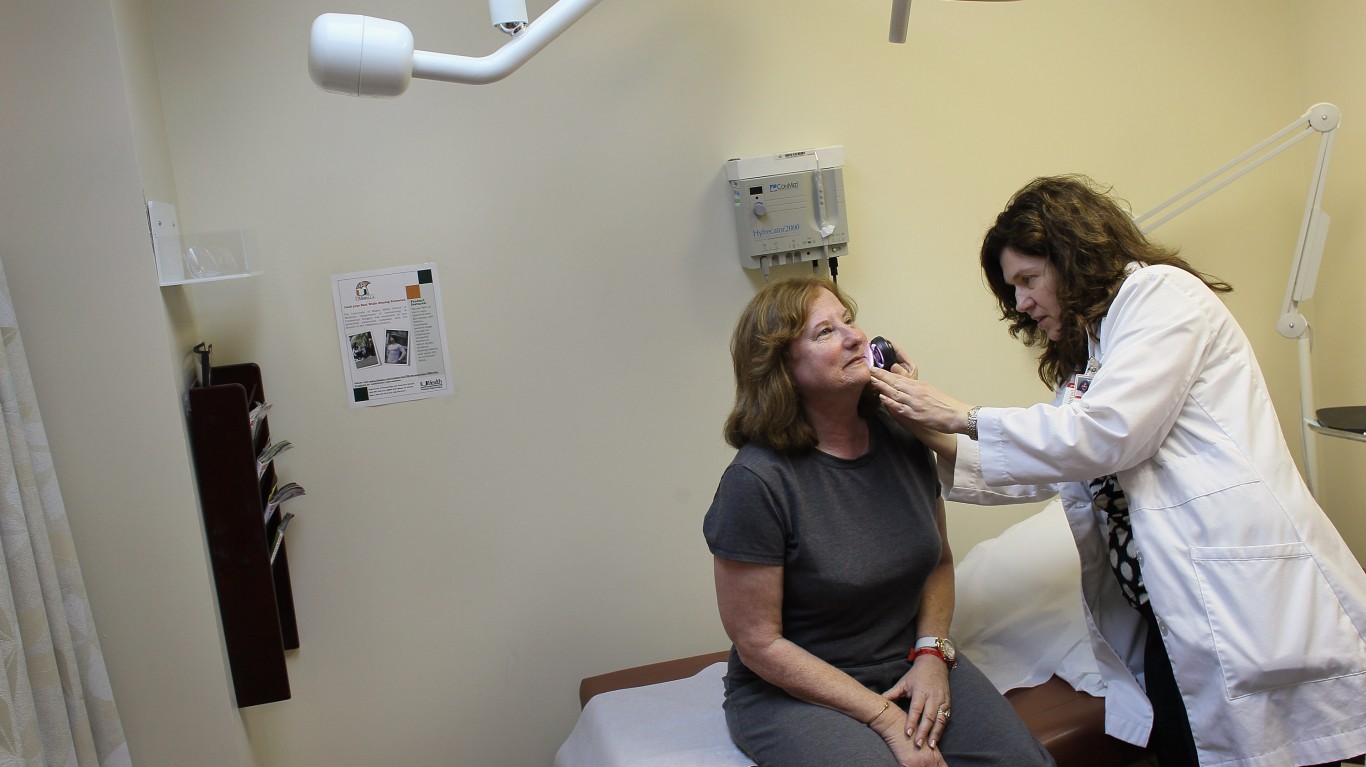
Published:

The leading causes of death have remained about the same for over a decade. In 2020, COVID-19 changed that. It was the third largest cause of death that year as it included 350,831. The figure will almost certainly be larger in 2021 when the CDC issues the latest figures. The top two spots have been consistent for years. In 2020, deaths from heart disease were 696,962. Deaths from cancer were 602,350.
At the same time, the incidence of cancer cases has declined in some 43 states in the past two-plus decades, and the state where they’ve declined the most is New Jersey. (These are the states fighting cancer most successfully since 2000.)
Both heart disease and cancer have been tied, in part, to the American lifestyle, which includes poor diet, obesity, and lack of exercise. For cancer in particular, risks include aging, personal or family history with cancer, tobacco use, obesity, alcohol, sunlight and other radiation, certain viruses, and cancer-causing substances in the environment. Avoiding or reducing these risk factors when possible could help prevent cancer.
While we cannot control aging – the median age of a cancer diagnosis is 66 years – we can minimize many of the other factors. Even simply increasing vaccination rates against the human papillomavirus would help prevent some cancer cases, as infections with high-risk types of HPV cause nearly all cervical cancers.
Smoking rates continue trending lower, from 23.3% of adults in 2000 to 13.7% in 2018, but no amount of tobacco use is safe. Tobacco use remains a leading cause of cancer – not just lung cancer, but several other types as well – and of cancer death. Further reducing smoking rates would also make a significant impact. (These are the states with the highest smoking rates.)
While smoking rates have decreased, obesity rates are trending higher. Nationwide, the adult obesity rate jumped from 30.5% in 1999-2000 to 42.4% in 2017-2018. The obese (those whose body mass index is 30 and over) may have an increased risk of cancers of the breast, colon, rectum, kidney, pancreas, and more.
As is true with most demographic numbers, cancer rates vary from place to place. To find the state where cancer incidence rates declined the most since 2000, 24/7 Tempo reviewed cancer incidence data from the Centers for Disease Control and Prevention WONDER Online Database. States were ranked by the percent change in the cancer incidence rate – the number of cancer cases per 100,000 age-adjusted population – from 2000 to 2018 (exceptions are noted). Adult obesity rates came from the CDC Behavioral Risk Factor Surveillance System Prevalence & Trends Data. Median household income figures are five-year estimates for 2020 from the Census Bureau American Community Survey.
Click here to see the states where new cancer cases have fallen the most since 2000
Though the number of cancer cases increased in every U.S. state between 2000 and 2018, 43 states managed to reduce cancer incidence rates anywhere from 1.5% to nearly 34% (due in part to demographic changes) – and nationwide, the cancer incidence rate declined from 484.28 per 100,000 population in 2000 to 435.77 per 100,000 in 2018, a 10% drop. And in New Jersey, the decline was a dramatic 33.89%.
43. Louisiana
> Pct. change in cancer incidence rate, 2000-2018: -1.55%
> Cancer cases, 2000: 20,755 or 494.3 per 100,000 – 20th highest
> Cancer cases, 2018: 26,935 or 486.6 per 100,000 – 2nd highest
> Adult obesity rate change: 13.2 ppt (from 23.6% in 2000 to 36.8% in 2018)
> Median household income, 2020: $50,800 – 4th lowest
[in-text-ad]

42. Nebraska
> Pct. change in cancer incidence rate, 2000-2018: -1.65%
> Cancer cases, 2000: 8,591 or 485.7 per 100,000 – 25th highest
> Cancer cases, 2018: 10,798 or 477.7 per 100,000 – 6th highest
> Adult obesity rate change: 13.0 ppt (from 21.1% in 2000 to 34.1% in 2018)
> Median household income, 2020: $63,015 – 25th highest

41. Virginia
> Pct. change in cancer incidence rate, 2000-2018: -1.80%
> Cancer cases, 2000: 29,632 or 438.7 per 100,000 – 7th lowest
> Cancer cases, 2018: 40,108 or 430.8 per 100,000 – 19th lowest
> Adult obesity rate change: 12.2 ppt (from 18.2% in 2000 to 30.4% in 2018)
> Median household income, 2020: $76,398 – 10th highest

40. Hawaii
> Pct. change in cancer incidence rate, 2000-2018: -1.88%
> Cancer cases, 2000: 5,263 or 418.8 per 100,000 – 3rd lowest
> Cancer cases, 2018: 7,552 or 410.9 per 100,000 – 12th lowest
> Adult obesity rate change: 9.2 ppt (from 15.7% in 2000 to 24.9% in 2018)
> Median household income, 2020: $83,173 – 4th highest
[in-text-ad-2]

39. Iowa
> Pct. change in cancer incidence rate, 2000-2018: -2.02%
> Cancer cases, 2000: 15,759 or 485.5 per 100,000 – 25th lowest
> Cancer cases, 2018: 18,715 or 475.7 per 100,000 – 7th highest
> Adult obesity rate change: 13.8 ppt (from 21.5% in 2000 to 35.3% in 2018)
> Median household income, 2020: $61,836 – 24th lowest

38. Georgia
> Pct. change in cancer incidence rate, 2000-2018: -2.96%
> Cancer cases, 2000: 33,007 or 473.4 per 100,000 – 19th lowest
> Cancer cases, 2018: 53,748 or 459.4 per 100,000 – 13th highest
> Adult obesity rate change: 11.0 ppt (from 21.5% in 2000 to 32.5% in 2018)
> Median household income, 2020: $61,224 – 22nd lowest
[in-text-ad]
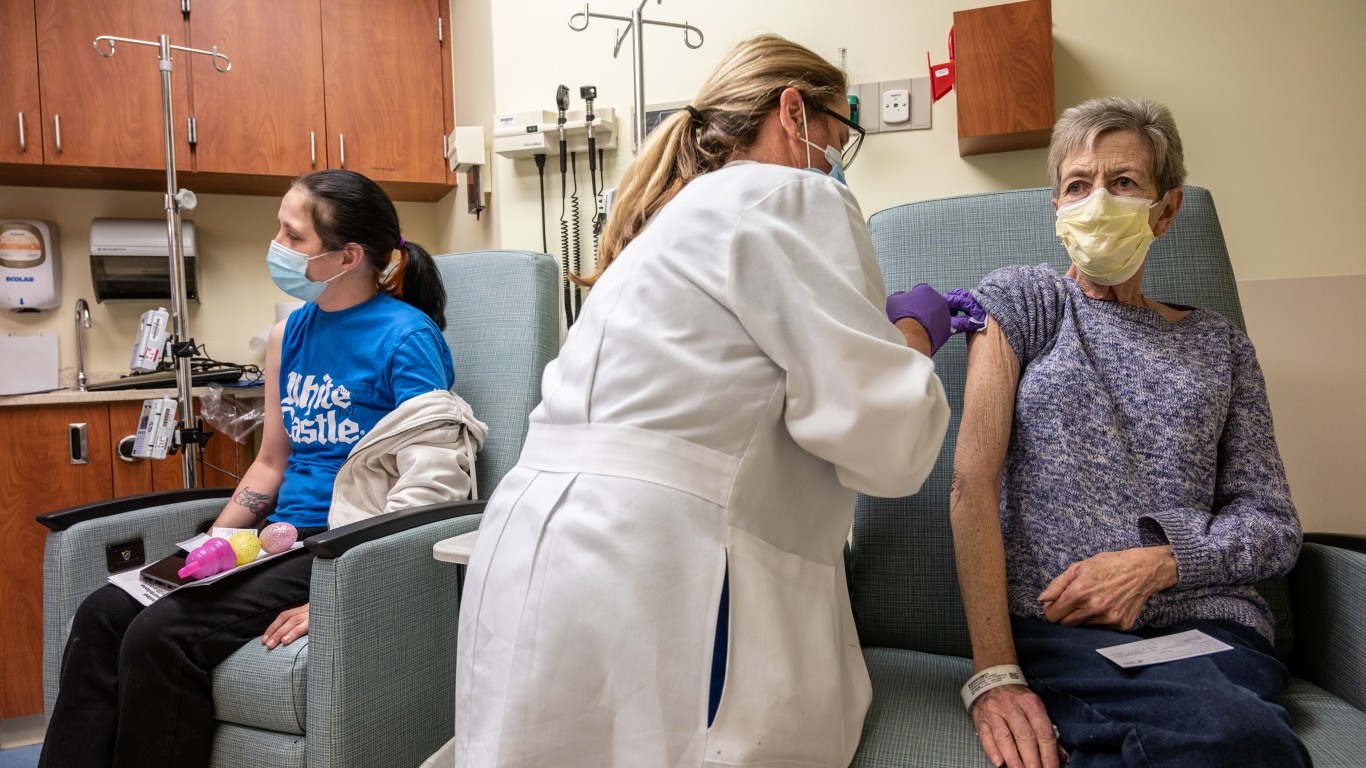
37. Kentucky
> Pct. change in cancer incidence rate, 2000-2018: -3.79%
> Cancer cases, 2000: 21,361 or 523.2 per 100,000 – 5th highest
> Cancer cases, 2018: 27,778 or 503.4 per 100,000 – the highest
> Adult obesity rate change: 13.6 ppt (from 23.0% in 2000 to 36.6% in 2018)
> Median household income, 2020: $52,238 – 7th lowest
36. Minnesota
> Pct. change in cancer incidence rate, 2000-2018: -4.16%
> Cancer cases, 2000: 22,767 or 478.2 per 100,000 – 23rd lowest
> Cancer cases, 2018: 30,944 or 458.3 per 100,000 – 14th highest
> Adult obesity rate change: 12.7 ppt (from 17.4% in 2000 to 30.1% in 2018)
> Median household income, 2020: $73,382 – 13th highest

35. Washington
> Pct. change in cancer incidence rate, 2000-2018: -4.46%
> Cancer cases, 2000: 28,099 or 506.9 per 100,000 – 13th highest
> Cancer cases, 2018: 38,055 or 484.3 per 100,000 – 4th highest
> Adult obesity rate change: 9.9 ppt (from 18.8% in 2000 to 28.7% in 2018)
> Median household income, 2020: $77,006 – 9th highest
[in-text-ad-2]
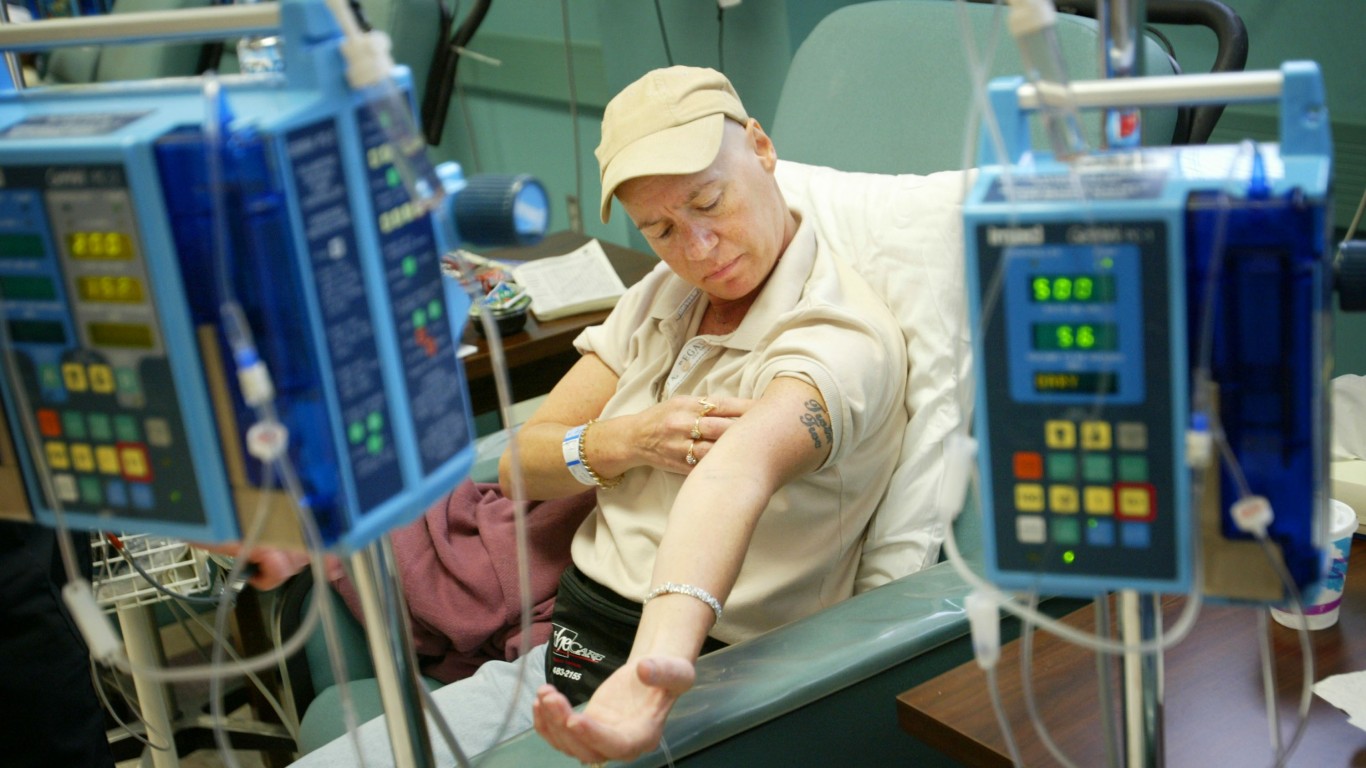
34. North Carolina
> Pct. change in cancer incidence rate, 2000-2018: -5.24%
> Cancer cases, 2000: 36,479 or 459.6 per 100,000 – 11th lowest
> Cancer cases, 2018: 58,056 or 435.5 per 100,000 – 20th lowest
> Adult obesity rate change: 11.2 ppt (from 21.8% in 2000 to 33.0% in 2018)
> Median household income, 2020: $56,642 – 12th lowest

33. Kansas
> Pct. change in cancer incidence rate, 2000-2018: -5.47%
> Cancer cases, 2000: 12,801 or 470.0 per 100,000 – 17th lowest
> Cancer cases, 2018: 15,346 or 444.3 per 100,000 – 24th highest
> Adult obesity rate change: 13.6 ppt (from 20.8% in 2000 to 34.4% in 2018)
> Median household income, 2020: $61,091 – 21st lowest
[in-text-ad]

32. New Hampshire
> Pct. change in cancer incidence rate, 2000-2018: -5.53%
> Cancer cases, 2000: 6,230 or 508.0 per 100,000 – 12th highest
> Cancer cases, 2018: 8,511 or 479.9 per 100,000 – 5th highest
> Adult obesity rate change: 11.5 ppt (from 18.1% in 2000 to 29.6% in 2018)
> Median household income, 2020: $77,923 – 7th highest

31. South Carolina
> Pct. change in cancer incidence rate, 2000-2018: -5.91%
> Cancer cases, 2000: 18,997 or 477.0 per 100,000 – 22nd lowest
> Cancer cases, 2018: 27,906 or 448.8 per 100,000 – 22nd highest
> Adult obesity rate change: 12.3 ppt (from 22.0% in 2000 to 34.3% in 2018)
> Median household income, 2020: $54,864 – 10th lowest

30. South Dakota
> Pct. change in cancer incidence rate, 2001-2018: -6.73%
> Cancer cases, 2001: 3,964 or 486.5 per 100,000 – 24th highest
> Cancer cases, 2018: 4,824 or 453.7 per 100,000 – 20th highest
> Adult obesity rate change: 10.3 ppt (from 19.8% in 2000 to 30.1% in 2018)
> Median household income, 2020: $59,896 – 20th lowest
[in-text-ad-2]

29. Ohio
> Pct. change in cancer incidence rate, 2000-2018: -7.32%
> Cancer cases, 2000: 55,879 or 473.9 per 100,000 – 20th lowest
> Cancer cases, 2018: 68,371 or 439.2 per 100,000 – 23rd lowest
> Adult obesity rate change: 12.5 ppt (from 21.5% in 2000 to 34.0% in 2018)
> Median household income, 2020: $58,116 – 15th lowest

28. Oregon
> Pct. change in cancer incidence rate, 2000-2018: -7.42%
> Cancer cases, 2000: 17,455 or 497.2 per 100,000 – 18th highest
> Cancer cases, 2018: 21,413 or 460.3 per 100,000 – 12th highest
> Adult obesity rate change: 8.4 ppt (from 21.5% in 2000 to 29.9% in 2018)
> Median household income, 2020: $65,667 – 18th highest
[in-text-ad]
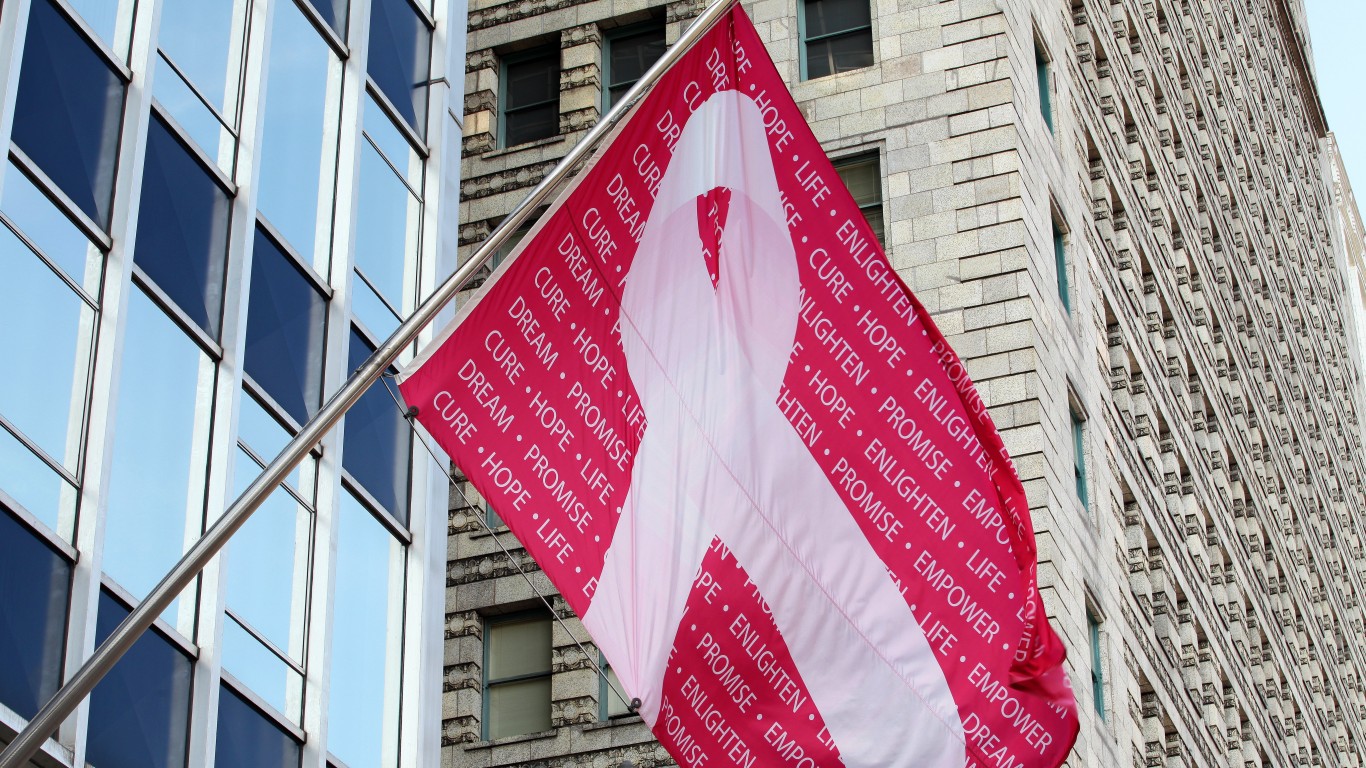
27. Illinois
> Pct. change in cancer incidence rate, 2000-2018: -7.98%
> Cancer cases, 2000: 59,194 or 493.5 per 100,000 – 21st highest
> Cancer cases, 2018: 69,403 or 454.1 per 100,000 – 18th highest
> Adult obesity rate change: 10.1 ppt (from 21.7% in 2000 to 31.8% in 2018)
> Median household income, 2020: $68,428 – 17th highest
26. Missouri
> Pct. change in cancer incidence rate, 2000-2018: -8.40%
> Cancer cases, 2000: 27,502 or 469.7 per 100,000 – 16th lowest
> Cancer cases, 2018: 33,143 or 430.3 per 100,000 – 18th lowest
> Adult obesity rate change: 12.9 ppt (from 22.1% in 2000 to 35.0% in 2018)
> Median household income, 2020: $57,290 – 13th lowest

25. New York
> Pct. change in cancer incidence rate, 2000-2018: -9.27%
> Cancer cases, 2000: 97,293 or 502.4 per 100,000 – 16th highest
> Cancer cases, 2018: 114,373 or 455.8 per 100,000 – 17th highest
> Adult obesity rate change: 9.9 ppt (from 17.7% in 2000 to 27.6% in 2018)
> Median household income, 2020: $71,117 – 14th highest
[in-text-ad-2]

24. West Virginia
> Pct. change in cancer incidence rate, 2000-2018: -9.38%
> Cancer cases, 2000: 10,627 or 503.9 per 100,000 – 15th highest
> Cancer cases, 2018: 12,210 or 456.7 per 100,000 – 16th highest
> Adult obesity rate change: 16.3 ppt (from 23.2% in 2000 to 39.5% in 2018)
> Median household income, 2020: $48,037 – 2nd lowest

23. Idaho
> Pct. change in cancer incidence rate, 2000-2018: -9.43%
> Cancer cases, 2000: 5,664 or 474.3 per 100,000 – 21st lowest
> Cancer cases, 2018: 8,761 or 429.5 per 100,000 – 17th lowest
> Adult obesity rate change: 9.5 ppt (from 18.9% in 2000 to 28.4% in 2018)
> Median household income, 2020: $58,915 – 17th lowest
[in-text-ad]

22. Pennsylvania
> Pct. change in cancer incidence rate, 2000-2018: -9.47%
> Cancer cases, 2000: 71,412 or 504.6 per 100,000 – 14th highest
> Cancer cases, 2018: 78,426 or 456.8 per 100,000 – 15th highest
> Adult obesity rate change: 9.7 ppt (from 21.2% in 2000 to 30.9% in 2018)
> Median household income, 2020: $63,627 – 22nd highest

21. Montana
> Pct. change in cancer incidence rate, 2000-2018: -9.59%
> Cancer cases, 2000: 4,796 or 499.7 per 100,000 – 17th highest
> Cancer cases, 2018: 6,412 or 451.7 per 100,000 – 21st highest
> Adult obesity rate change: 11.0 ppt (from 15.9% in 2000 to 26.9% in 2018)
> Median household income, 2020: $56,539 – 11th lowest
20. Maryland
> Pct. change in cancer incidence rate, 2000-2018: -10.44%
> Cancer cases, 2000: 25,125 or 495.2 per 100,000 – 19th highest
> Cancer cases, 2018: 32,389 or 443.6 per 100,000 – 25th highest
> Adult obesity rate change: 10.7 ppt (from 20.2% in 2000 to 30.9% in 2018)
> Median household income, 2020: $87,063 – the highest
[in-text-ad-2]

19. Indiana
> Pct. change in cancer incidence rate, 2000-2018: -10.92%
> Cancer cases, 2000: 28,955 or 481.4 per 100,000 – 24th lowest
> Cancer cases, 2018: 34,396 or 428.8 per 100,000 – 16th lowest
> Adult obesity rate change: 12.3 ppt (from 21.8% in 2000 to 34.1% in 2018)
> Median household income, 2020: $58,235 – 16th lowest

18. Delaware
> Pct. change in cancer incidence rate, 2000-2018: -12.22%
> Cancer cases, 2000: 4,158 or 517.1 per 100,000 – 9th highest
> Cancer cases, 2018: 5,890 or 453.9 per 100,000 – 19th highest
> Adult obesity rate change: 16.9 ppt (from 16.6% in 2000 to 33.5% in 2018)
> Median household income, 2020: $69,110 – 16th highest
[in-text-ad]
17. Maine
> Pct. change in cancer incidence rate, 2000-2018: -12.43%
> Cancer cases, 2000: 7,600 or 531.9 per 100,000 – 2nd highest
> Cancer cases, 2018: 9,134 or 465.8 per 100,000 – 10th highest
> Adult obesity rate change: 10.4 ppt (from 20.0% in 2000 to 30.4% in 2018)
> Median household income, 2020: $59,489 – 19th lowest

16. Oklahoma
> Pct. change in cancer incidence rate, 2000-2018: -12.47%
> Cancer cases, 2000: 16,363 or 459.8 per 100,000 – 12th lowest
> Cancer cases, 2018: 20,480 or 402.5 per 100,000 – 9th lowest
> Adult obesity rate change: 15.1 ppt (from 19.7% in 2000 to 34.8% in 2018)
> Median household income, 2020: $53,840 – 8th lowest

15. Texas
> Pct. change in cancer incidence rate, 2000-2018: -13.73%
> Cancer cases, 2000: 83,227 or 472.9 per 100,000 – 18th lowest
> Cancer cases, 2018: 120,013 or 408.0 per 100,000 – 10th lowest
> Adult obesity rate change: 11.7 ppt (from 23.1% in 2000 to 34.8% in 2018)
> Median household income, 2020: $63,826 – 21st highest
[in-text-ad-2]
14. Arizona
> Pct. change in cancer incidence rate, 2000-2018: -14.07%
> Cancer cases, 2000: 22,091 or 428.3 per 100,000 – 5th lowest
> Cancer cases, 2018: 32,863 or 368.1 per 100,000 – 2nd lowest
> Adult obesity rate change: 10.3 ppt (from 19.2% in 2000 to 29.5% in 2018)
> Median household income, 2020: $61,529 – 23rd lowest

13. Colorado
> Pct. change in cancer incidence rate, 2000-2018: -14.74%
> Cancer cases, 2000: 16,785 or 454.2 per 100,000 – 8th lowest
> Cancer cases, 2018: 24,550 or 387.3 per 100,000 – 3rd lowest
> Adult obesity rate change: 8.8 ppt (from 14.2% in 2000 to 23.0% in 2018)
> Median household income, 2020: $75,231 – 11th highest
[in-text-ad]
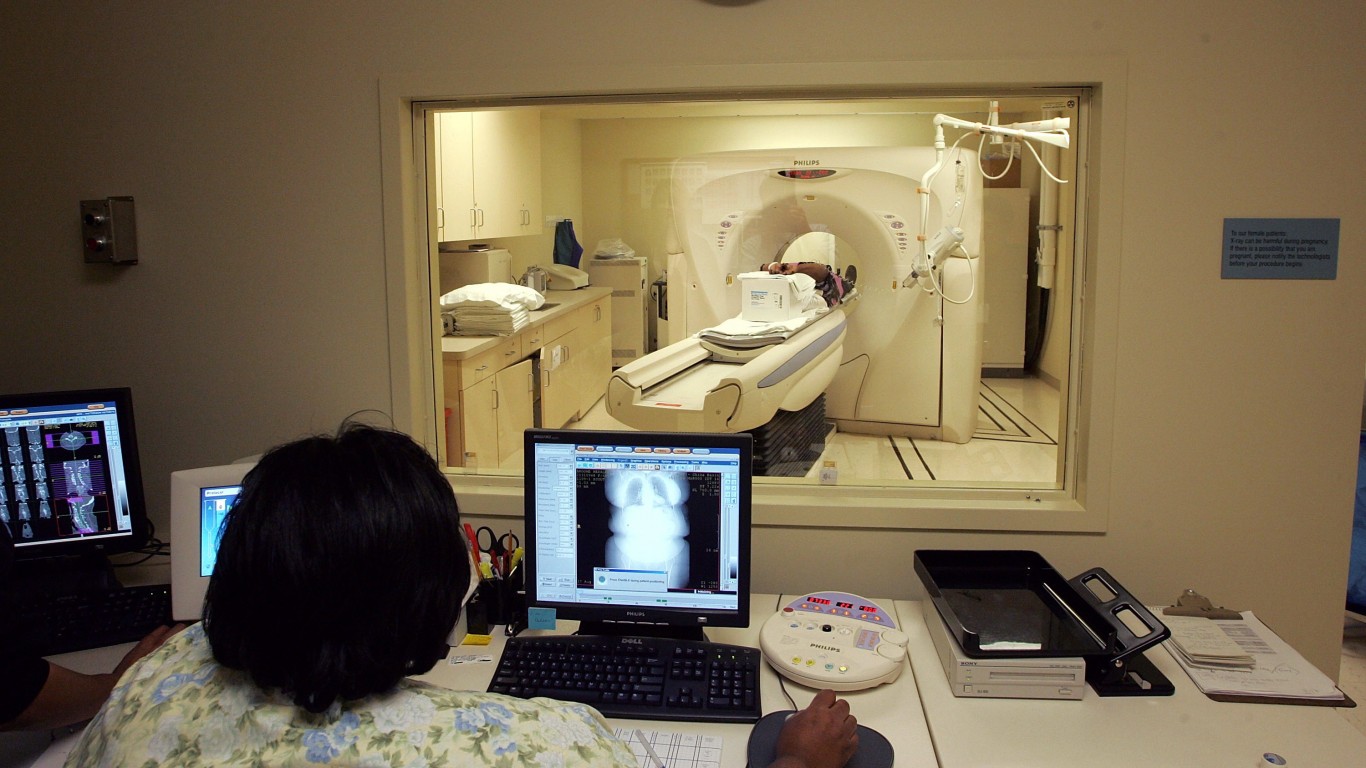
12. Connecticut
> Pct. change in cancer incidence rate, 2000-2018: -14.92%
> Cancer cases, 2000: 19,202 or 525.0 per 100,000 – 4th highest
> Cancer cases, 2018: 20,734 or 446.7 per 100,000 – 23rd highest
> Adult obesity rate change: 10.0 ppt (from 17.4% in 2000 to 27.4% in 2018)
> Median household income, 2020: $79,855 – 5th highest

11. Wyoming
> Pct. change in cancer incidence rate, 2000-2018: -15.36%
> Cancer cases, 2000: 2,234 or 465.7 per 100,000 – 14th lowest
> Cancer cases, 2018: 2,812 or 394.2 per 100,000 – 5th lowest
> Adult obesity rate change: 11.0 ppt (from 18.0% in 2000 to 29.0% in 2018)
> Median household income, 2020: $65,304 – 20th highest

10. California
> Pct. change in cancer incidence rate, 2000-2018: -15.64%
> Cancer cases, 2000: 137,497 or 460.4 per 100,000 – 13th lowest
> Cancer cases, 2018: 171,748 or 388.4 per 100,000 – 4th lowest
> Adult obesity rate change: 5.9 ppt (from 19.9% in 2000 to 25.8% in 2018)
> Median household income, 2020: $78,672 – 6th highest
[in-text-ad-2]

9. Michigan
> Pct. change in cancer incidence rate, 2000-2018: -16.05%
> Cancer cases, 2000: 51,216 or 522.2 per 100,000 – 7th highest
> Cancer cases, 2018: 56,095 or 438.4 per 100,000 – 22nd lowest
> Adult obesity rate change: 10.6 ppt (from 22.4% in 2000 to 33.0% in 2018)
> Median household income, 2020: $59,234 – 18th lowest

8. Florida
> Pct. change in cancer incidence rate, 2000-2018: -16.25%
> Cancer cases, 2000: 103,952 or 522.8 per 100,000 – 6th highest
> Cancer cases, 2018: 131,409 or 437.8 per 100,000 – 21st lowest
> Adult obesity rate change: 12.0 ppt (from 18.7% in 2000 to 30.7% in 2018)
> Median household income, 2020: $57,703 – 14th lowest
[in-text-ad]

7. Massachusetts
> Pct. change in cancer incidence rate, 2000-2018: -17.88%
> Cancer cases, 2000: 34,467 or 518.3 per 100,000 – 8th highest
> Cancer cases, 2018: 36,637 or 425.6 per 100,000 – 14th lowest
> Adult obesity rate change: 8.9 ppt (from 16.8% in 2000 to 25.7% in 2018)
> Median household income, 2020: $84,385 – 3rd highest

6. Wisconsin
> Pct. change in cancer incidence rate, 2000-2018: -19.06%
> Cancer cases, 2000: 26,694 or 487.0 per 100,000 – 23rd highest
> Cancer cases, 2018: 33,727 or 394.2 per 100,000 – 5th lowest
> Adult obesity rate change: 12.0 ppt (from 20.0% in 2000 to 32.0% in 2018)
> Median household income, 2020: $63,293 – 24th highest

5. Nevada
> Pct. change in cancer incidence rate, 2000-2017: -19.52%
> Cancer cases, 2000: 9,648 or 513.8 per 100,000 – 11th highest
> Cancer cases, 2017: 14,382 or 413.5 per 100,000 – 13th lowest
> Adult obesity rate change: 11.6 ppt (from 17.9% in 2000 to 29.5% in 2018)
> Median household income, 2020: $62,043 – 25th lowest
[in-text-ad-2]

4. Vermont
> Pct. change in cancer incidence rate, 2000-2018: -19.60%
> Cancer cases, 2000: 3,099 or 490.9 per 100,000 – 22nd highest
> Cancer cases, 2018: 3,852 or 394.7 per 100,000 – 7th lowest
> Adult obesity rate change: 9.3 ppt (from 18.2% in 2000 to 27.5% in 2018)
> Median household income, 2020: $63,477 – 23rd highest

3. Rhode Island
> Pct. change in cancer incidence rate, 2000-2018: -21.00%
> Cancer cases, 2000: 6,168 or 539.9 per 100,000 – the highest
> Cancer cases, 2018: 6,242 or 426.5 per 100,000 – 15th lowest
> Adult obesity rate change: 10.6 ppt (from 17.1% in 2000 to 27.7% in 2018)
> Median household income, 2020: $70,305 – 15th highest
[in-text-ad]

2. Alaska
> Pct. change in cancer incidence rate, 2000-2018: -22.28%
> Cancer cases, 2000: 2,057 or 515.5 per 100,000 – 10th highest
> Cancer cases, 2018: 2,990 or 400.7 per 100,000 – 8th lowest
> Adult obesity rate change: 8.5 ppt (from 21.0% in 2000 to 29.5% in 2018)
> Median household income, 2020: $77,790 – 8th highest

1. New Jersey
> Pct. change in cancer incidence rate, 2000-2018: -33.89%
> Cancer cases, 2000: 46,465 or 530.0 per 100,000 – 3rd highest
> Cancer cases, 2018: 53,194 or 350.4 per 100,000 – the lowest
> Adult obesity rate change: 7.2 ppt (from 18.5% in 2000 to 25.7% in 2018)
> Median household income, 2020: $85,245 – 2nd highest
Retirement planning doesn’t have to feel overwhelming. The key is finding expert guidance—and SmartAsset’s simple quiz makes it easier than ever for you to connect with a vetted financial advisor.
Here’s how it works:
Why wait? Start building the retirement you’ve always dreamed of. Click here to get started today!
Thank you for reading! Have some feedback for us?
Contact the 24/7 Wall St. editorial team.